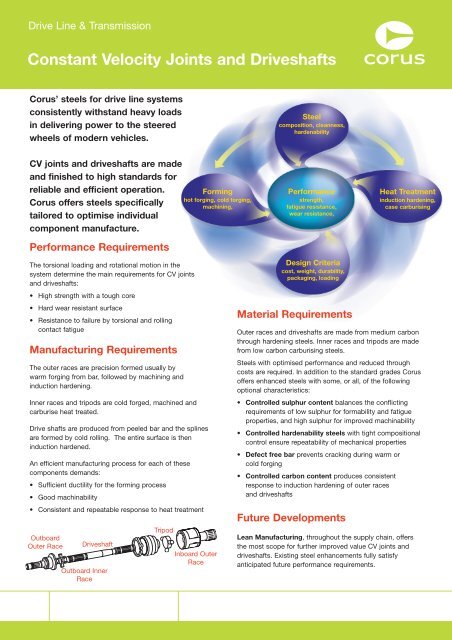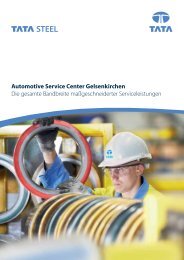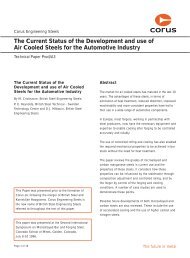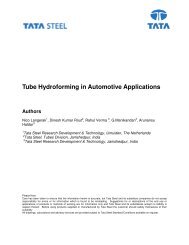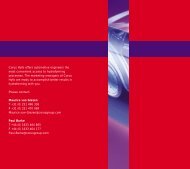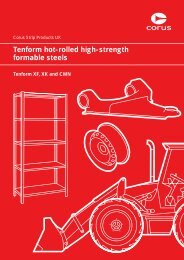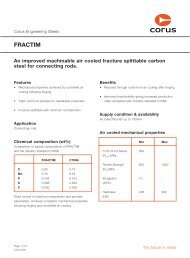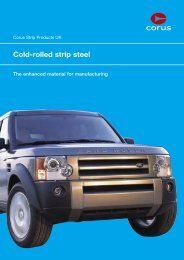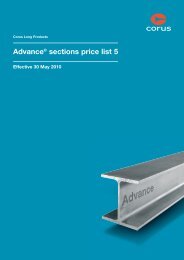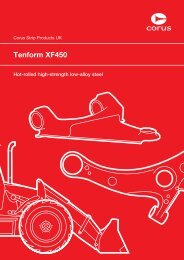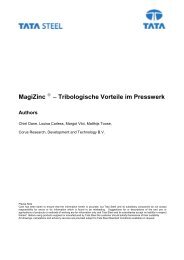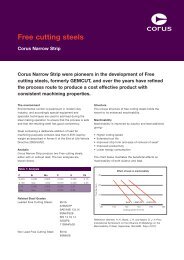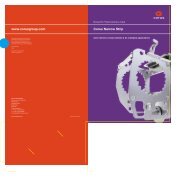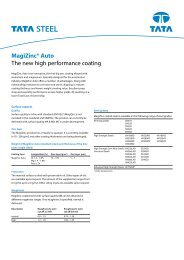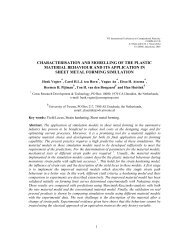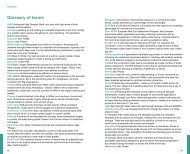Constant Velocity Joints And Driveshafts - Automotive
Constant Velocity Joints And Driveshafts - Automotive
Constant Velocity Joints And Driveshafts - Automotive
You also want an ePaper? Increase the reach of your titles
YUMPU automatically turns print PDFs into web optimized ePapers that Google loves.
Drive Line & Transmission<br />
<strong>Constant</strong> <strong>Velocity</strong> <strong>Joints</strong> and <strong>Driveshafts</strong><br />
Corus’ steels for drive line systems<br />
consistently withstand heavy loads<br />
in delivering power to the steered<br />
wheels of modern vehicles.<br />
CV joints and driveshafts are made<br />
and finished to high standards for<br />
reliable and efficient operation.<br />
Corus offers steels specifically<br />
tailored to optimise individual<br />
component manufacture.<br />
Performance Requirements<br />
The torsional loading and rotational motion in the<br />
system determine the main requirements for CV joints<br />
and driveshafts:<br />
• High strength with a tough core<br />
• Hard wear resistant surface<br />
• Resistance to failure by torsional and rolling<br />
contact fatigue<br />
Manufacturing Requirements<br />
The outer races are precision formed usually by<br />
warm forging from bar, followed by machining and<br />
induction hardening.<br />
Inner races and tripods are cold forged, machined and<br />
carburise heat treated.<br />
Drive shafts are produced from peeled bar and the splines<br />
are formed by cold rolling. The entire surface is then<br />
induction hardened.<br />
An efficient manufacturing process for each of these<br />
components demands:<br />
• Sufficient ductility for the forming process<br />
• Good machinability<br />
• Consistent and repeatable response to heat treatment<br />
Outboard<br />
Outer Race<br />
Driveshaft<br />
Outboard Inner<br />
Race<br />
Tripod<br />
Forming<br />
hot forging, cold forging,<br />
machining,<br />
Inboard Outer<br />
Race<br />
Steel<br />
composition, cleanness,<br />
hardenability<br />
Performance<br />
strength,<br />
fatigue resistance,<br />
wear resistance,<br />
Design Criteria<br />
cost, weight, durability,<br />
packaging, loading<br />
Material Requirements<br />
Heat Treatment<br />
induction hardening,<br />
case carburising<br />
Outer races and driveshafts are made from medium carbon<br />
through hardening steels. Inner races and tripods are made<br />
from low carbon carburising steels.<br />
Steels with optimised performance and reduced through<br />
costs are required. In addition to the standard grades Corus<br />
offers enhanced steels with some, or all, of the following<br />
optional characteristics:<br />
• Controlled sulphur content balances the conflicting<br />
requirements of low sulphur for formability and fatigue<br />
properties, and high sulphur for improved machinability<br />
• Controlled hardenability steels with tight compositional<br />
control ensure repeatability of mechanical properties<br />
• Defect free bar prevents cracking during warm or<br />
cold forging<br />
• Controlled carbon content produces consistent<br />
response to induction hardening of outer races<br />
and driveshafts<br />
Future Developments<br />
Lean Manufacturing, throughout the supply chain, offers<br />
the most scope for further improved value CV joints and<br />
driveshafts. Existing steel enhancements fully satisfy<br />
anticipated future performance requirements.
<strong>Constant</strong> <strong>Velocity</strong> <strong>Joints</strong> and <strong>Driveshafts</strong><br />
Material Selection<br />
Steels for CV joints and driveshafts are highly developed products. Appropriate grades for the different applications,<br />
and their typical chemical composition (wt %) are:<br />
Designation<br />
C50*<br />
C45<br />
38B3<br />
16MnCr5<br />
20MnCr5<br />
18CrMo4<br />
Material Properties<br />
C<br />
0.50<br />
0.45<br />
0.38<br />
0.16<br />
0.20<br />
0.18<br />
Consistency of Induction Hardening Response<br />
Calculated from the chemical composition, the ideal diameter<br />
(DI) is a recognised measure of hardenability. Using fully<br />
computerised control of steelmaking and models of<br />
hardenability response, Corus’ enhanced 38B3 driveshaft steel<br />
achieves a narrow 10mm range of DI, fully satisfying<br />
customers needs for tight specifications to control variations<br />
in mechanical properties. This consistency is a significant<br />
improvement on comparable standard steels which typically<br />
have a DI range >50mm.<br />
Corus steels for CV joints and driveshafts are used by:<br />
Fiat, Honda, Land Rover, Nissan, Opel, Rover, Toyota, VW<br />
Mn<br />
0.75<br />
0.75<br />
0.95<br />
1.15<br />
1.25<br />
0.75<br />
* C50 is used for both outer races and driveshafts. Lower sulphur levels for improved formability are normally specified for outer races.<br />
Frequency (%)<br />
35<br />
30<br />
25<br />
20<br />
15<br />
10<br />
5<br />
Distribution of DI<br />
S<br />
0.015<br />
0.025<br />
0.030<br />
0.030<br />
0.030<br />
0.030<br />
0<br />
38 39 40 41 42 43 44 45 46 47 48 49 50<br />
DI (mm)<br />
Cr<br />
1.00<br />
1.15<br />
1.00<br />
Mo<br />
0.20<br />
Consistency of Hardenability<br />
Corus achieves tight control of hardenability from cast to<br />
cast. Results on over 50 casts of 16MnCr5 steel fall within<br />
a much narrower hardenability band than specified by the<br />
recognised standard BS EN 10084:1998<br />
Corus Engineering Steels PO Box 50 Aldwarke Lane Rotherham S60 1DW United Kingdom<br />
Telephone +44 (0) 1709 371234 Facsimile +44 (0) 1709 826233 www.corusengineeringsteels.com<br />
Hardness (HRc)<br />
- -<br />
- -<br />
- -<br />
B<br />
-<br />
-<br />
0.002<br />
-<br />
-<br />
-<br />
Component<br />
Outer Races<br />
<strong>Driveshafts</strong><br />
Inner Races<br />
and Tripods<br />
Steel grade: 38B3<br />
50<br />
45<br />
Steel grade: 16MnCr5<br />
40<br />
35<br />
30<br />
25<br />
20<br />
Hardenability Control<br />
15<br />
0 10 20 30 40 50<br />
Corus<br />
-<br />
-<br />
Position (mm)<br />
BS EN


